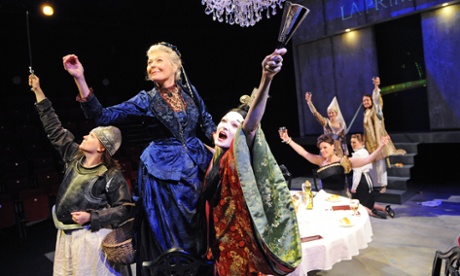Caryl Churchill, who will be 80 on 3 September, was once compared by a fellow writer to Pablo Picasso. At first, it seems a bizarre coupling: a bull-like Spanish painter-sculptor and an intellectual British dramatist. But, as you think about it, the comparison makes sense. Like Picasso, Churchill has an active political conscience, has had a big influence on succeeding generations and is a restless experimenter with form. That last quality is, for me, the key to an extraordinary career that has yielded close to 40 plays and made Churchill an iconic figurehead.
Given the surge in plays by women in recent years, one forgets just how isolated Churchill must have felt when she set out. She began writing at Oxford but, while raising a family in the 1960s, focused exclusively on short plays for radio. She had her first stage play, Owners, put on at the Royal Court Theatre Upstairs in 1972 at a time when there were scarcely any role-models for women dramatists. Ann Jellicoe, another experimental dramatist, was the only major woman writer to have emerged from the Court’s chauvinist culture, Shelagh Delaney had flared like a rocket with one hit and then fizzled out and Agatha Christie had her secure niche in the West End. Otherwise, that was just about it. To whom was a young woman dramatist to turn for inspiration?
I suspect it was that combination of her isolation, the imaginative freedom she had learned from radio and her inquisitive intellect that made Churchill strike out on her own. Even as a fledgling dramatist in the 1960s she had said that “whenever conventions of subject and form outlast the impetus that formed them they are felt to be inadequate to expressing life”. That could be seen as the mantra that has governed her whole theatrical career, from Owners to Escaped Alone in 2016. James Macdonald, who directed Drunk Enough to Say I Love You? at the Royal Court in 2006, put it succinctly when he said “Caryl is always ahead of the game ... She would only hand something in as a new play if for her its form and content were new in the theatre.”
If today Churchill is lauded for her novelty, and all dramatists – men as well as women – feel free to experiment, it wasn’t that easy at the start. I liked Owners, in which Churchill anticipated the rampant individualism of the 1980s through the figure of a ruthless female landlord but complained that “she throws everything in bar the kitchen sink”. Others were more severe. One critic said that the play failed for want of elementary disciplines, “namely unity of action and unity of tone – those much despised classical standards”. Yet who was to say that Aristotelian rules were still applicable? Churchill’s achievement was to break through that kind of conservative, male thinking to capture the fragmentation of life and show that each new play was an adventure into the unknown.
A sign of Churchill’s capacity for innovation was her readiness to engage in a radical new way of writing plays involving collaborative research. That sprang from her association with Max Stafford-Clark who in 1974 had created, with William Gaskill, the Joint Stock company as a theatrical collective. By the time Churchill joined, the company had already had a striking success with David Hare’s Fanshen, but it was with Joint Stock that Churchill wrote Light Shining in Buckinghamshire (1976), Cloud Nine (1979) and Fen (1983). Although it wasn’t a Joint Stock show, the same techniques were also used to create Serious Money (1987), which became a Royal Court and West End mega-hit.
Even with the Joint Stock method, the dramatist is still the undisputed author of the finished play: the difference is that he or she is part of the research process. Light Shining in Buckinghamshire, which dealt with the millennial movements bred by the English civil war, was an obvious eye-opener. “I’d never seen an exercise or an improvisation before and was as thrilled as a child at a pantomime,” Churchill said of the first day in rehearsal. But, while obviously benefiting from the group approach, the play stands up today as one of Churchill’s very best: a study of the way the Utopian dreams of the Levellers and Diggers had been crushed by Cromwell’s army evoking parallels with the disillusion that followed the collapse of the revolutionary hopes of the 1960s. As always, Churchill also tries new techniques. Anticipating the kind of Tribunal Plays that were to become popular at the Tricycle theatre in the 1990s, Churchill incorporates the Putney Debates of 1647, in which arguments for liberty and equality were out-manoeuvred by the unyielding English faith in the sanctity of private property.
Churchill has never stopped experimenting with form. The danger is that one sometimes overlooks what she is saying in our fascination with the way she is saying it: what I see in her work is a socialist-feminist perspective that has expanded to embrace a vision of impending catastrophe. But what Churchill gets little credit for is detecting early on that it is no sign of progress for women simply to replicate a ruthless male success ethic. It was there in Owners when the protagonist announced her philosophy: “Be clean, be quick, be top, be best.” That is also the credo of Marlene in the magnificent Top Girls, who runs her own thriving employment agency but presides over a company simmering with discontent and finally confronts the vacancy in her own life.
This is vintage Churchill in that radical form and content coalesce. Churchill, who had been struck in America by women boasting of boardroom promotion as the ultimate goal, is arguing there is no such thing as right-wing feminism. At the same time, the play’s action is a series of revelations. It starts with Marlene hosting a dinner-party for famous women of history and myth who emerge as both pioneers and victims, goes on to give us a satiric vision of office-life and climaxes in a painfully naturalistic study of the drudgery and fear experienced by the sister and child Marlene abandoned. Forget unity of tone: this is Churchill showing that form follows function and that a play can be written in a miscellany of styles.
One consequence of being ahead of the game is that you sometimes leave the punters panting in your wake, and not all Churchill’s experiments have worked. I recall being baffled by Softcops, which felt like a meditation on crime and punishment lacking Churchill’s usual gift of narrative drive. A Mouthful of Birds was equally mystifying in its attempt to create a dance-drama suggesting that the violence and ecstasy of Euripides’ The Bacchae were alive in modern Britain.
But anyone who takes as many risks as Churchill is bound to have her failures. Far more important is that, at an age when many writers are simply content to build on the territory they have already colonised, Churchill goes on exploring. In Blue Heart she played fascinating games with time and language while introducing surrealist touches: who, but Churchill, would import an SS officer, an emu and a gang of children into a modern domestic kitchen? Far Away transported us, in three short scenes, from localised fascism to cosmic destruction. And most recently in Escaped Alone she whisked us from cosy chat in a sunlit garden to Cassandra-like monologues about a disintegrating planet. I once thought there was a determinist gloom about Churchill’s prophecies of disaster: I now believe that she is offering a necessary jolt to our shocking complacency.
But there is another side to Churchill we often overlook: she is a reluctant interviewee but a ceaseless campaigner. She resigned from the English Stage Company’s governing council in 1989 over the Royal Court’s sponsorship deals, has come out fighting in defence of many other writers including a vilified Sarah Kane and only last week was co-signatory to a letter to the Guardian deploring the bombing of a cultural centre in Gaza. Some will not forget that she got into trouble in 2009 for writing a 10-minute play, Seven Jewish Children, which suggested that Israel’s understandable preoccupation with national security was leading it into acts of indiscriminate slaughter.
Without wishing to resurrect old arguments, that play was another sign of one of Churchill’s key qualities: a total lack of fear. In my few brief encounters with her, she has struck me as a very modest, quiet person with a built-in reserve. As a writer, however, she has offered a critique of modern society from diverse viewpoints, opened doors for other dramatists and helped to dismantle antiquated, man-made notions of theatrical structure. If nowadays there is no consensus about form and a play can be whatever its author chooses it to be, then that is largely thanks to the pioneering, Picasso-like figure of Caryl Churchill.











